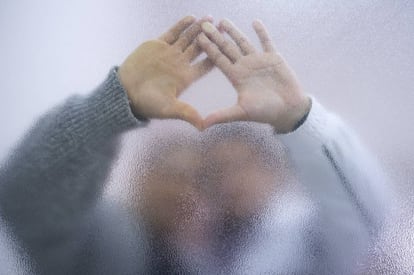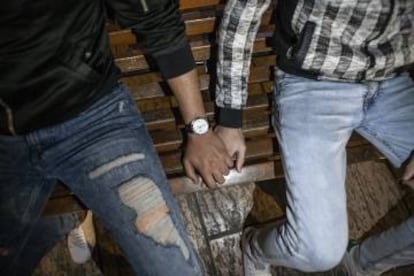How homosexuals are being jailed and persecuted just 20 kilometers from Spain
The punishment in Morocco for intimate relations with someone of the same sex is up to three years behind bars, pushing many to seek asylum in the Spanish exclave city Melilla

Youssef sips his mojito then says, “Have I ever told my family I am gay? No, never. I am an only child. I would rather tell my parents that I had killed someone. First, they would consider it something wrong that could be fixed by a spell in jail. Secondly, they would never forgive me.”
At 25 years old, Youssef (not his real name) is thin with an eye-catching fringe. He has lived all his life in Marrakesh, one of Morocco’s most cosmopolitan cities. And he has the misfortune of being attracted to other men in a world where being gay is against the law. “I think the only way not to have problems is to use [dating apps] Tinder, Grindr or Growlr,” he says. “I use them to meet new people. I am a homosexual and it is not a mistake. No one is going to change it. It is simply how I am, even if I have to avoid showing that side of me in public. And that’s because there’s huge hypocrisy here. Foreign gay couples are allowed to come here and stroll around as an item. But not those of us from here. They put us in jail.”

Like many others, Youssef is afraid of Article 489 of the Moroccan criminal code, which punishes sexual relations between people of the same sex. Punishments range from six months to three years behind bars and a fine of up to 1,000 dirhams, which is around €100. The judge can decide on the severity of the sentence, taking into account the seriousness of whatever act has been committed and the personal circumstances of the accused. But there are no established mitigating circumstances. The defendants are at the mercy of the judge. According to the Procurator’s 2018 Report, 197 people were arrested for being homosexual in Morocco in 2017. When the report was published last June, there were still 137 cases open.
Youssef says that no one has ever seen him with another man. “I think it will be harder when I get to the age when I am expected to marry,” he says. “That will be difficult because I’ll have two choices: one, I can choose to pretend I am heterosexual and live a fake life so that no one suspects anything, which is what a lot of people do. Or I can go and live in another country, far from where I was brought up. And I don’t really fancy that.”
I would rather tell my parents that I had killed someone than that I am homosexual
Youssef, 25
This is echoed by others, not only in Marrakesh and the rest of the country, but also in other countries. “In Morocco and North Africa, the freedom of gender identity and sexual preference is curtailed, despite the fact these are human rights both on a social and state level,” says José María Núñez, president of the Triangle Foundation, which works in a number of countries in the region.
“Homosexuality in Morocco is taboo. There is a lot of homophobia,” says activist Betty Lachgar. “It needs a double-pronged approach: fighting against the law on the one hand and against public opinion on the other.”
Lachgar lives in a three-story house in a trendy area of Rabat, the capital of Morocco. On the walls, there are banners and posters linked to various causes. She is co-founder of the Alternative Movement for the Freedom of Individuals (MALI) and is an internationally recognized Moroccan activist. Like Youssef, she mentions the hypocrisy of Moroccan authorities. “It also happens with collectives that are dedicated to LGBTI activism,” she says. “The authorities know we are trying to change things, that we are fighting to change the law. They know about everything we do, but they don’t let us legalize it.
Chafiq, who also lives in Marrakesh, has not been so lucky. His story went viral last December when he returned from a New Year’ Eve party with friends. Driving home, he had a minor accident involving a motorcyclist. “I kept driving but several meters ahead, I decided to go back to see what had happened,” he says.
It was the worst decision of his life. Chafiq was dressed as a woman with a purple dress, high heels and a purple wig. “When I went back, the police were there. They dragged me out of the car to make fun of me. They humiliated me and handcuffed me and took me to the police station and afterwards they shared all my details on the internet and with a number of journalists.”

Defining himself as a woman trapped in a man’s body, Chafiq admits that he has been cross-dressing for some time, but had lived the kind of life that had earned him the respect of his family and friends until last December 31. Prior to that night, he had spent more than 10 years in the Moroccan Armed Forces and when he came out, he found a good job in a dentist’s clinic that allowed him to live comfortably. The accident with the motorbike changed everything. “After the videos were shared, nothing was the same. My neighbors recognized me and insulted me when I went out. My mother went into a state of shock. It was catastrophic,” he says. The Moroccan government reprimanded the police officers involved but the damage was already done.
Seeking asylum
Like Chafiq, there are others who try for asylum in Europe. But the bureaucracy can take time and the response to the request is not always positive. Others choose to flee on foot. Since 2009, when those suffering from LGBTI persecution could apply for asylum in Spain, the number of applications has risen significantly. According to the United Nation’s refugee department UNHCR, most of the LGBTI asylum petitions come from Morocco.
For the past four months, Said has been living in the Temporary Immigration Detention Center (CETI) in Melilla, a Spanish exclave city in North Africa, along with 700 others, in front of a golf course and facing the fence separating Spain and Morocco. “I am here because of all the problems I have had with my family for being gay,” he says.
In 2017, 197 people were arrested for being homosexual in Morocco
Now 20 years old, he was born in a small town south of Nador, a city 10 kilometers from the Melilla border. “I have made a formal asylum application, but I haven’t heard anything yet,” he says, adding that his life had hit a wall back home. “I didn’t have a steady job, but I earned a living doing this and that,” he says. “I was doing alright. Then one day my brother saw me with my boyfriend at home and everything went wrong. He beat me up really badly. And he told my father. They went after my boyfriend who is now in jail. And I had to get out of there. I was no longer welcome. My mother did accept me, but not my father and brother.”
The ease of buying a fake passport and joining the 30,000 people who cross daily from Morocco to Melilla has turned the exclave city into a refuge for people fleeing circumstances like those of Said. They ask for asylum either at the border or once they are over it. Then they show that they need international protection. Once they have answered a questionnaire, they are interviewed in the presence of a lawyer and translator. And finally, the authorities send them to the CETI to await the outcome. “They take a long time to reply to us Moroccans,” says Said. “The Syrians and the Palestinians get out of here quickly. But they leave us here for several months. I don’t understand why.”
My brother saw me with my boyfriend at home and everything went wrong. He beat me up really badly
Said, 20
“Those applying for asylum because of sexual identity report that they have been witnesses to beatings and even honor killings in Morocco,” says Rafael Robles, president of the Melilla Gay and Lesbian Association (AMLEGA). This collective, which works on projects with migrants, such as the Melilla Observatory against Homophobia, says 50 people apply for asylum because of gender issues or sexual preference in Melilla every year. “Once in Melilla, the guys talk about their troubles at home, such as the impossibility of being visible as a homosexual,” adds Robles. “Some of the applicants come from Nador which means their nightmare continues even after they have crossed the border, as they have to keep seeing their family on an almost daily basis.”
Violet and Samira (not their real names) are among those who have crossed the border with false passports. Since they have been in Melilla, they haven’t stopped smiling or holding hands. They are about to get married. But there won’t be anyone at their wedding, not even friends. They had to leave their homes to get married because they are lesbians. “The police caught us together and told our families,” says Violet. “And then the insults became constant. I was told I was a lesbian and a whore.”
Despite the fact no one was hauled up before a judge for being a lesbian until 2016 – when they were acquitted – Violet and Samira believe they had no option but to leave their country. The social pressure they face is, they say, much worse than the law.
English version by Heather Galloway.
Tu suscripción se está usando en otro dispositivo
¿Quieres añadir otro usuario a tu suscripción?
Si continúas leyendo en este dispositivo, no se podrá leer en el otro.
FlechaTu suscripción se está usando en otro dispositivo y solo puedes acceder a EL PAÍS desde un dispositivo a la vez.
Si quieres compartir tu cuenta, cambia tu suscripción a la modalidad Premium, así podrás añadir otro usuario. Cada uno accederá con su propia cuenta de email, lo que os permitirá personalizar vuestra experiencia en EL PAÍS.
¿Tienes una suscripción de empresa? Accede aquí para contratar más cuentas.
En el caso de no saber quién está usando tu cuenta, te recomendamos cambiar tu contraseña aquí.
Si decides continuar compartiendo tu cuenta, este mensaje se mostrará en tu dispositivo y en el de la otra persona que está usando tu cuenta de forma indefinida, afectando a tu experiencia de lectura. Puedes consultar aquí los términos y condiciones de la suscripción digital.








































